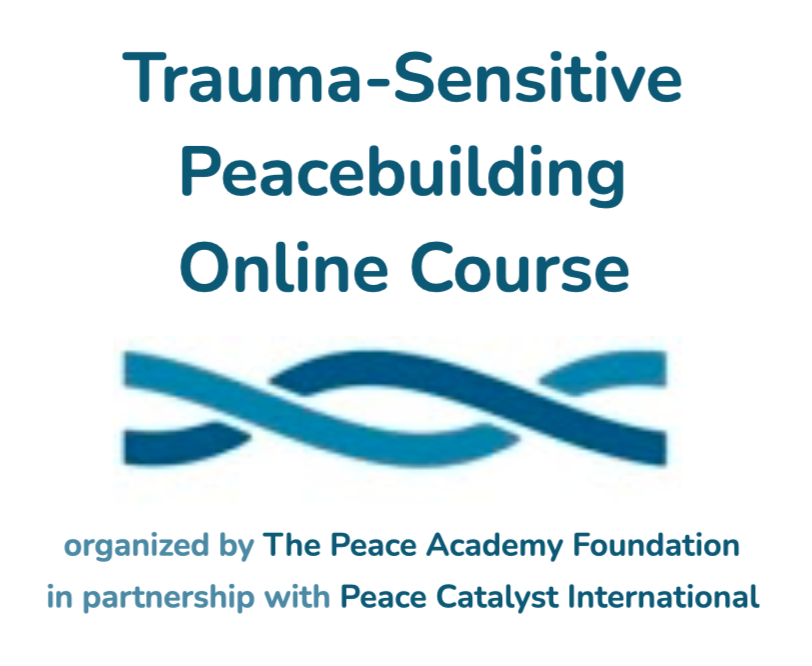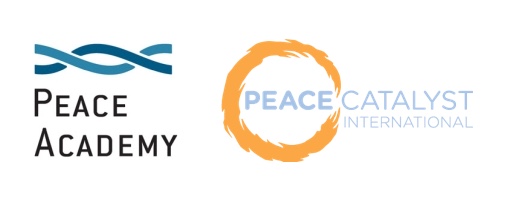As societies continue to fracture along political, ethnic, and ideological lines, becoming aware of and being equipped to deal with various types of trauma is increasingly relevant for all of us in our families, everyday relationships, workplaces, and communities. Trauma-sensitive peacebuilding requires that we recognize and acknowledge individual, communal, and historical harms and incorporate strategies for healing individuals and societies. This fall from October 4 to November 12, The Peace Academy Foundation, in partnership with Peace Catalyst International, is offering a 5-week online course “Trauma-Sensitive Peacebuilding.” Led by trauma-sensitive peacebuilding trainers, this course aims to contribute to an international conversation about trauma and peacebuilding by providing interactive approaches to recognize and respond to trauma as peacebuilders. This course is intended as an introductory to intermediate training for people in caring professions (e.g. social workers, counselors, teachers, pastors, etc.), students and activists passionate about trauma healing and/or peacebuilding, and everyday people who are interested in getting involved in peacebuilding work in their communities.

As societies continue to fracture along political, ethnic, and ideological lines, becoming aware of and being equipped to deal with various types of trauma is increasingly relevant for all of us in our families, everyday relationships, workplaces, and communities. Trauma-sensitive peacebuilding requires that we recognize and acknowledge individual, communal, and historical harms and incorporate strategies for healing individuals and societies. This fall from October 4 to November 12, The Peace Academy Foundation, in partnership with Peace Catalyst International, is offering a 5-week online course “Trauma-Sensitive Peacebuilding.” Led by trauma-sensitive peacebuilding trainers, this course aims to contribute to an international conversation about trauma and peacebuilding by providing interactive approaches to recognize and respond to trauma as peacebuilders. This course is intended as an introductory to intermediate training for people in caring professions (e.g. social workers, counselors, teachers, pastors, etc.), students and activists passionate about trauma healing and/or peacebuilding, and everyday people who are interested in getting involved in peacebuilding work in their communities.
Course Description
Trauma is a heavy word signalling tragedy, loss and pain. People with trauma often become stuck in a cycle and the suffering is less a memory than a repetition of the event in the present. However, trauma also has an incredible power for transformation, growth and wisdom. Thus both realities – painful destructiveness and new power – are true. In order to understand these opposites, we must learn about trauma holistically: its effect upon us individually – touching mind, heart, soul and our physical bodies – and collectively, affecting our homes, neighborhoods, towns, countries and world. This course takes participants on a journey through “my” trauma, but also “our” trauma. Those of us who work with communities impacted by trauma, violence and conflict would do well to become aware of the complexities of these forces and adhere to essential ethics that this course teaches: to do no harm; to uphold dignity; to recognize common humanity and respect diversity and difference.
This course utilizes a variety of methodologies including facilitated discussions, role playing, lectures by guest speakers, and self-paced at-home learning to fulfill the following course objectives:
- To understand what trauma is and is not, and to recognize it in the context of peacebuilding and conflict transformation;
- To differentiate between individual, intergenerational, collective and social trauma and discuss how they interact in conflict transformation settings;
- To become familiar with key trauma-informed practices, strategies and tools;
- To reflect on experience with traumatized persons and communities, specifically with guest speakers from Bosnia & Herzegovina and Rwanda;
- To develop practices for self-care and resilience, both due to the effects of personal trauma and vicarious and secondary trauma;
- To consider intercultural growth and competence and contextual awareness around trauma and healing in conflict (transformation); and
- To share and exchange about current needs related to trauma-sensitivity in peacebuilding.
In addition to attending all online sessions, participants will be expected to: complete assignments at home; create and present “inner maps” on individual and collective trauma, intercultural self-awareness and self-care strategies; and keep personal journals for ongoing self-care.
This course is unique for several reasons. First, diverse international instructors bring a depth and richness to course content that resonate with participants from a wide variety of backgrounds. Second, this course focuses not just on individual trauma, but on a wide range of trauma that impacts both individuals and society, including collective trauma, cycles of violence, and the transmission of life experiences from parents to children that can create intergenerational trauma and cultures of violence. Third, course content focuses on understanding intercultural relationships and how the traumatic and violent histories of racism and colonialism require another layer of sensitivity for practitioners and the populations with which they’re working. Finally, during this course participants will be led to develop and engage in introspective practices to understand their own triggers and personal histories with trauma in order to develop proactive self-care practices. If we as practitioners do not develop resilience to live well, we cannot adequately care for the populations we impact daily.
Course Dates and Time
- Format: The entire event will happen online via Zoom. 2 live calls per week, 2 hours per call; 4 hours total per week, in addition to self-paced at-home assignments
- Dates: Mondays and Wednesdays between October 11 to November 3, 2021 (Oct 11, 13, 18, 20, 25, 27, and Nov. 1, 3), with a two-hour opening session on October 4, and one-hour final individual consultations for each participant the week of November 8-12
- Time: 5-7pm Central European Time (11am-1pm ET, 8-10am PT)
Course Content Overview
- Week 1 - Getting to Know Trauma, including symbols and associations of trauma, acute and traumatic stress, primary and secondary trauma, and inner mapping
- Week 2 - Narratives and Cycles of Trauma, including intergenerational trauma, collective memory, victimization, cycles of victimhood and violence, and narrative role play
- Week 3 - Do No Harm: Ethical and Moral Responsibility, including ethical responsibility, entitlement, privilege, stereotypes and prejudices, histories of oppression, and tactile tools for focus and self-awareness
- Week 4 - Self-Care and Resilience, including compassion fatigue, building resilience, and self-care practices, tools and strategies
- Week 5 - One-on-One Consultations, when participants have individual sessions with the course facilitators
Applying
If you wish to participate, please fill out the Online Application Form. You will be automatically notified when we receive your application. You will also receive an email from us not later than 7 days after replying to inform you if we need any additional information.
Applications are open until September 27, 2021.
If you have any questions or concerns regarding your participation or need other information in this regard, please contact us at Ova e-maila adresa je zaštićena od spambotova. Omogućite JavaScript da biste je vidjeli. or Ova e-maila adresa je zaštićena od spambotova. Omogućite JavaScript da biste je vidjeli..
Applications will be reviewed on a rolling basis, and you will be notified about the selection of your application 7 days after applying or at the latest by September 20th.
Participation Prerequisites
- Willingness to attend the selected course during its whole duration;
- Willingness to fulfil all obligations related to the course (reading the recommended literature and writing an essay if you would like to receive a certificate);
- Fluency in English;
- Minimum age for participation is 21 years;
- Participation fee payment after your application has been selected.
- In addition, the participants will need:
- A computer or mobile device with a camera, microphone, and speakers
- A headset with microphone is useful (but not required) for this purpose and to cut down on background noise
- A strong enough internet connection to connect to Zoom (click here for Zoom technical specifications)
- The ability to access and download documents from the Peace Academy’s online learning platform (Moodle)
- The ability to stream videos posted by instructors.
*As we learn and share our own experiences of trauma, we encourage participants to seek the support of friends, family and/or counselors if and when needed. Awareness of the impacts of trauma on our lives and communities requires that we create and continue to build supports that are nurturing and life giving for our lives and work.
Participation Fee
The participation fee is $600 USD (approximately 500€) per participant. The participation fee should be paid after you receive confirmation that you have been accepted.
Participation fees can be paid via Peace Academy’s partner Peace Catalyst International on their Trauma-Sensitive Peacebuilding course payment page (or follow the "Make A Payment" Button from the bottom of the PCI course page). Participants will be informed about the payment deadline after they are notified of their selection. Participation fees will be due before the start of the course.
For all additional information regarding the course, please contact us at:
The Peace Academy:
- Contact person: Mirela Popaja-Hadžić, Peace Academy Foundation Course Coordinator
- Email: Ova e-maila adresa je zaštićena od spambotova. Omogućite JavaScript da biste je vidjeli.
- Mobile/WhatsApp/Viber: +387 63280771
Peace Catalyst International:
- Contact person: Bryan Carey, Peacebuilding Consultant and Accompanier
- Email: Ova e-maila adresa je zaštićena od spambotova. Omogućite JavaScript da biste je vidjeli.
- Mobile/WhatsApp/Viber: +387 603276274
We are looking forward to receiving your applications!


